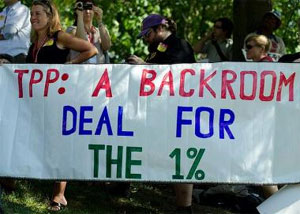Unfortunately, one policy that President Obama and Republicans agree on is "free" trade agreements, an area they could make quick progress on next year by fast-tracking the Trans-Pacific Partnership (TPP).
Called "NAFTA on Steroids," Obama wants the extremely controversial TPP – between the US and 12 Pacific Rim countries – to be fast-tracked through Congress even before the details are known to its members and the public!
In our background article, Trans-Pacific Partnership Could Move Way Too Fast, we noted the widespread opposition from the labor and environmental communities. And for good reason: the treaty could be the final step toward corporate control.

Multinational corporations would be able to "protect their future profit potential" by suing cities, counties, states or countries to wipe out existing laws – those specifically designed to protect communities’ best interests, but which get in the way of ultimate profits.
Forget environmental requirements, minimum wage, food safety regulations, the right to ban GMOs or fracking – any local ordinance could be challenged as a "barrier to trade." It could even restrict signatory nations from exercising capital controls to prevent and mitigate financial crises and promote financial stability.
Essentially, corporations would be elevated to nation-status, with the ability to sue governments in private trade tribunals – for unlimited amounts of money – over anything that gets in the way of profits.
If Congress votes Yes on the Fast-Track bill, the Bipartisan Congressional Trade Priorities Act of 2014, it’s voting to tie its hands on all trade deals, including the US-EU pact under discussion. Congress would have 90 days to take a simple up-or-down vote – no amendments would be allowed and even debate would be limited.
TPP – the biggest trade agreement ever – currently includes countries that produce 40% of world GDP: the US, Canada, Japan, Australia, New Zealand, Mexico, Chile, Peru, Brunei, Singapore and Vietnam, and eventually every Pacific Rim nation could be included.
It’s interesting that one of the planks Obama ran on in 2008 was his opposition to NAFTA and similar trade deals, but now he strongly supports them.
A report released on the 20th Anniversary of NAFTA demonstrates that it’s been bad for the environment and for workers, but great for big corporations.
On his Asia trip this week, he said: "What we are seeing is momentum building around a Trans-Pacific Partnership that can spur greater economic growth, spur greater jobs growth, set high standards for trade and investment throughout the Asia-Pacific."
While Obama says he won’t support a pact without strong environmental and labor provisions, the evidence simply isn’t there. Read our article, WikiLeaks Reveals Environment Chapter of Trans-Pacific Partnership Deal.
